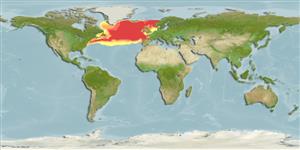Teleostei (teleosts) >
Argentiniformes (Marine smelts) >
Microstomatidae (Pencil smelts)
Eponymy: Fridtjof Nansen (1861–1930) was a Norwegian explorer, scientist, diplomat and later recipient of the Nobel Peace Prize. [...] (Ref. 128868), visit book page.
Environment: milieu / climate zone / depth range / distribution range
Ecology
Marine; bathypelagic; depth range 0 - 1400 m (Ref. 5123). Deep-water; 66°N - 35°N
North Atlantic: off southern Iceland eastward and southward to about 35°N. One record is from western Greenland and two are from North America to 40°N. Western Indian Ocean: South Africa, near Zanzibar, and Maldives (Ref. 26165).
Size / Weight / Age
Maturity: Lm ? range ? - ? cm
Max length : 24.5 cm SL male/unsexed; (Ref. 4773)
Dorsal soft rays (total): 9 - 10; Anal soft rays: 8 - 10; Vertebrae: 42 - 45. Adults silvery. Ventral fins inserted ahead of dorsal fin. Dorsal fin inserted in front of the midpoint of the body. Stomachs and peritoneum coated with dark pigment (Ref. 37473). Branchiostegal rays 3. Pyloric caeca 7-8.
Spawns mainly in spring and early summer.
Life cycle and mating behavior
Maturity | Reproduction | Spawning | Eggs | Fecundity | Larvae
Cohen, D.M., 1984. Argentinidae (including Microstomatidae). p. 386-391. In P.J.P. Whitehead, M.-L. Bauchot, J.-C. Hureau, J. Nielsen and E. Tortonese (eds.) Fishes of the north-eastern Atlantic and the Mediterranean, Volume 1. Unesco, Paris. (Ref. 4773)
IUCN Red List Status (Ref. 130435: Version 2024-2)
Threat to humans
Harmless
Human uses
Tools
Special reports
Download XML
Internet sources
Estimates based on models
Preferred temperature (Ref.
123201): 2.1 - 10.7, mean 7.3 °C (based on 278 cells).
Phylogenetic diversity index (Ref.
82804): PD
50 = 0.5000 [Uniqueness, from 0.5 = low to 2.0 = high].
Bayesian length-weight: a=0.00389 (0.00180 - 0.00842), b=3.12 (2.94 - 3.30), in cm total length, based on all LWR estimates for this body shape (Ref.
93245).
Trophic level (Ref.
69278): 3.4 ±0.4 se; based on size and trophs of closest relatives
Fishing Vulnerability (Ref.
59153): Low vulnerability (20 of 100).
